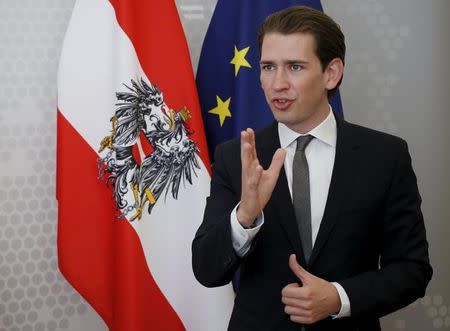Austria foreign minister calls for greater urgency on migrant crisis

By Karin Strohecker VIENNA (Reuters) - Austria's Foreign Minister Sebastian Kurz said European leaders needed to devise a common plan urgently to tackle the wave of migrants arriving in the bloc or risk having more and more countries resorting to their own measures. Hundreds of thousands of people fleeing wars in the Middle East and poverty elsewhere have braved the Mediterranean Sea and land routes across the Balkans, and many have died attempting to reach the European Union. The influx has stretched the bloc's asylum system to breaking point, but EU interior ministers are not due to meet to discuss the crisis until Sept. 14. "It's unfathomable that during the financial crisis it was possible to meet all the time and find a common solution, and with this refugee crisis nothing is happening for weeks or months," Sebastian Kurz told Reuters. "The challenge for Europe is not just the high number of refugees, but also the fact that the Dublin system does not work at this point in time," he said, referring to rules that require migrants to apply for asylum in the first European Union country they arrive in. Kurz backed the idea of distributing migrants according to a quota system across the bloc, and said he expected to hear more details of a French-German initiative at an informal meeting of EU foreign ministers in Luxembourg on Friday and Saturday. French President Francois Hollande said on Thursday that Paris and Berlin had agreed to propose a permanent and mandatory system to take in refugees and asylum seekers, especially Syrians, in the EU. Failure to find a solution swiftly posed a danger to some of the most basic premises of the joint bloc, Kurz added. "Many of our standards, many of our basic principles are at danger here. Not being able to secure your outside borders means that more and more governments are questioning the model of open borders," he said, referring to the Schengen agreement that has eliminated border controls among 26 states in the EU. Asked about Britain's resistance to take in refugees in much greater numbers while its government is on a quest to renegotiate its ties with the European Union, Kurz said London's reform proposals should be used to have a wider debate about the future shape of the bloc. "The refugee crisis has shown us that the EU is anything but a finished project and we need to have a discussion on how to improve it," he said. "But of course there always has to be some give and take." (Editing by Hugh Lawson)

